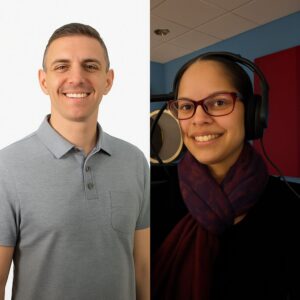Menu
Joshua L. Martin and Kelly Elizabeth Wright
University of Florida + University of Wisconsin-Madison

Joshua L. Martin (University of Florida) is a linguist who has researched the intersection of language, race, and technology, particularly linguistic bias against African American Language in automatic speech recognition systems. His recent work includes “Bias in automatic speech recognition: The case of African American Language” (with Kelly E. Wright), “Understanding Racial Disparities in Automatic Speech Recognition: The Case of Habitual ‘Be’” and “Spoken Corpora Data, Automatic Speech Recognition, and Bias Against African American Language: The case of Habitual 'Be'”. Martin can be reached at joshua.martin@ufl.edu.
Kelly Elizabeth Wright (University of Wisconsin-Madison) is a Black Biracial cisgender woman from Appalachia. She is an experimental sociolinguist researching linguistic racism across institutions through mixed methodologies including perceptual experimentation, machine learning, and ethnographic fieldwork. Her recent work includes “Language and Discrimination: Generating Meaning, Perceiving Identities, and Discriminating Outcomes”. She is also a contributing editor to American Speech's Among the New Words column. Wright can be reached at kewright4@wisc.edu.
Talk Information:
Linguistic Bias in Automatic Speech Recognition: The Case of African American Language
June 13, 2025 | 9:00 AM
Research on bias in artificial intelligence has grown exponentially in recent years, especially around racial bias. Many modern technologies that impact people’s lives have been shown to have significant racial biases, including automatic speech recognition (ASR) systems. Emerging studies have found that widely used ASR systems function much more poorly on the speech of Black people. Yet, this work is limited because it lacks a deeper consideration of the sociolinguistic literature on African American Language (AAL). In this talk, then, we seek to integrate AAL research into these endeavors to analyze ways in which ASRs might be biased against the linguistic features of AAL and how the use of biased ASRs could prove harmful to speakers of AAL. Specifically, we (1) will provide an overview of the ways in which AAL has been discriminated against in the workforce and healthcare in the past, and (2) explore how introducing biased ASRs in these areas could perpetuate or even deepen linguistic discrimination. We will conclude with a number of questions for reflection and future work.